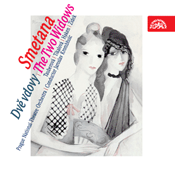Among his eight operas, The Two Widows (Dvě vdovy) stands in the center of those works. After The Bartered Bride (Prodaná nevěsta) Smetana produced two operas on historic topics, Dalibor (1865, rev. 1870) and Libuse (1869-72), and then took inspiration from the contemporary dramatist Pierre-Félicien Mallefille, whose romantic comedy Les deux veuves (1860) was popular in Paris and was available in Czech translation by Emmanuel František Züngel (1840-1895). A century after its premiere, the opera is practically unknown except in the Czech Republic, and even then, this recently issued CD of the work reproduces an LP recording based on live performances given between 28 November and 13 December 1956.
Smetana’s operas are intriguing works because each differs from the others in various ways. Thus, unlike Smetana’s earlier works in the genre The Brandenburgers in Bohemia (Braniboři v Čechách) or The Bartered Bride, with their folk-based humor, The Two Widows is a more cosmopolitan romantic comedy, a perspective that is connected with its French dramatic source. The plot itself deals with the arrival of a young man into the lives of two widows, Karolina and her cousin Anežka. At Karolina’s estate, the celebration of the harvest is complicated by a young man who is aimlessly shooting. In contrast to her more ascetic cousin Anežka, the wealthy and beautiful Karolina approaches the situation with a sense of humor by having Karolina’s gamekeeper Mumlal bring the young man to the house for a mock trial, since Karolina seems intrigued by the youth, Ladislav. They imposed upon Ladislav a fine to be given to the poor and also require him to stay in the manor house for a certain time. Anticipating the dénouement, the first act ends with a paean to love. The second act echoes to a degree Mozart’s Così fan tutte, with the two widows discussing and, eventually, working out their romantic prospects. Since Karolina had been encouraging Anežka to remarry, Karolina suggests that her cousin consider Ladislav and, if her cousin would not take him, Karolina would do so. Anežka rejects Ladislav, but it gradually becomes known that Ladislav’s purpose in visiting the estate was to seek Anežka. Karolina backs away from any interest in Ladislav, and Anežka’s change of heart occurs when she herself dons the ball gown Karolina was to wear and agrees to consider Ladislav. By the end of the opera the various differences are resolved, and the work ends in a celebration of love and romance.
Among Smetana’s operas The Two Widows is characteristically conversational, and the work succeeds in its blending of declamatory passages that further the plot and set pieces that call attention to the pertinent details. In this sense it stands between a work like Dalibor, which relies strongly on lyrical numbers, and the more conversation-oriented structure of his last completed opera The Devil’s Wall (Čertova stěna). This kind of work lends itself well to the idiomatic performance preserved in this recording, with its cast of native speakers, whose inflections and emphases serve the libretto well. This particular recording is the only one currently available in commercial release and remains a solid, convincing performance. As much as it would be possible to perform the work outside of the current Czech Republic, it would be difficult to assemble a cast sufficiently familiar with the language so that the result would be convincing. Thus, it is useful to have this performance, which was made during the Cold War, and available on LP through Supraphon. Originally recorded between 28 November 1956 and 13 December 1956 at the Rudolfinum in Prague, the recording was issued on LP. No longer available in that format, the original tapes were remastered in 2007 for release on CD.
Thus, the cast of this recording is relatively unfamiliar in the West, and they represent some of the talented singers who were active in the Czech-speaking world in the mid-twentieth century. The two widows are performed by Maria Tauberová (Karolina) and Drahomira Tikalová (Anežka), with the Ladislav sung by Ivo Židek. As Karolina Tauberová’s voice is resonant, and her ringing tones stand in contrast to the deep bass of Eduard Haken in the role of Mumlal, Karolina’s gamekeeper. A challenge of this work is to arrive at two sopranos whose voices work well together in the title roles, and Tikalová worked well with Tauberová in various passages that require a close ensemble. If Tauberová’s upper range is sometimes a bit brighter than Tikalová’s, Tikalová has a distinct lower range that supports the duets. With the tenor role of Ladislav, Židek fits the character of the impetuous youth with this supple and ringing tone. The upper range conveys a sense of ease and fluidity that is necessary for the part of Ladislav, and his resonant technique emerges nicely in the duet with Mumlal in the fifth scene of the first act.
One of the strengths of the performance is the articulate and richly balanced chorus, which sets the tone at the opening of the opera in the harvest scene. The chorus has a warm sound and, even though the scoring is sometimes thick, they evince a welcome precision that brings out the sometimes angular rhythms. Likewise, the orchestra is supportive without dominating, and the string textures that are at the core of Smetana’s score, emerge clearly.
The CD release of this performance of this rarely heard opera makes available a work that demonstrates some aspects of Smetana’s work that are not found in The Bartered Bride. In a work that relies on various ensembles throughout to bring out the nuances of plot, The Two Widows stands apart from the folk-opera idiom associated with that earlier work and sometimes perceived popular operettas like The Merry Widow. Closer in style to some of the operas of Dvorak than other composers, The Two Widows deserves to be heard, and this fine performance from 1956 represents the score well, with its fine cast, chorus, and orchestra.
James L. Zychowicz
